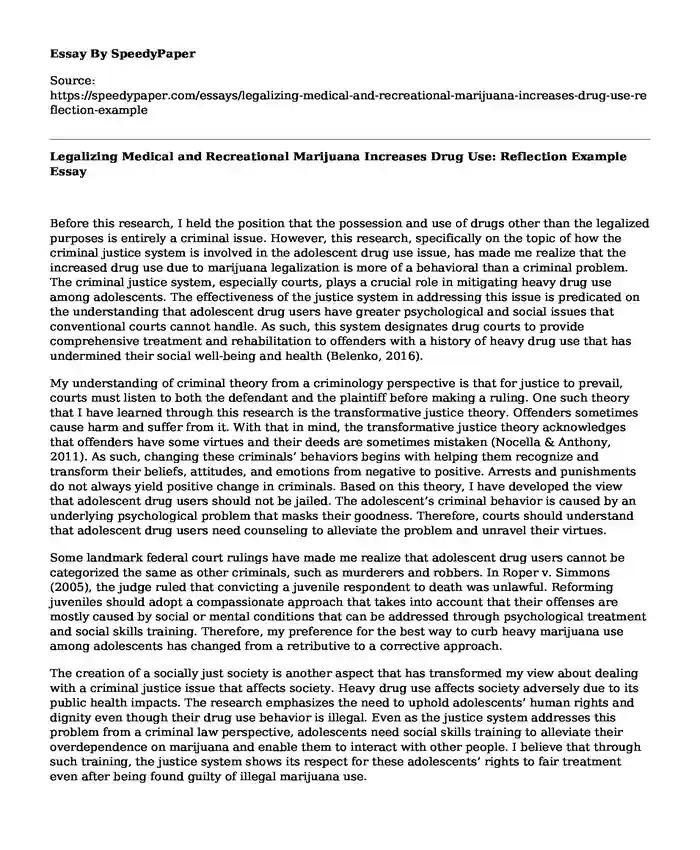
| Essay type: | Reflective essays |
| Categories: | Drug Marijuana legalization |
| Pages: | 3 |
| Wordcount: | 672 words |
Before this research, I held the position that the possession and use of drugs other than the legalized purposes is entirely a criminal issue. However, this research, specifically on the topic of how the criminal justice system is involved in the adolescent drug use issue, has made me realize that the increased drug use due to marijuana legalization is more of a behavioral than a criminal problem. The criminal justice system, especially courts, plays a crucial role in mitigating heavy drug use among adolescents. The effectiveness of the justice system in addressing this issue is predicated on the understanding that adolescent drug users have greater psychological and social issues that conventional courts cannot handle. As such, this system designates drug courts to provide comprehensive treatment and rehabilitation to offenders with a history of heavy drug use that has undermined their social well-being and health (Belenko, 2016).
My understanding of criminal theory from a criminology perspective is that for justice to prevail, courts must listen to both the defendant and the plaintiff before making a ruling. One such theory that I have learned through this research is the transformative justice theory. Offenders sometimes cause harm and suffer from it. With that in mind, the transformative justice theory acknowledges that offenders have some virtues and their deeds are sometimes mistaken (Nocella & Anthony, 2011). As such, changing these criminals’ behaviors begins with helping them recognize and transform their beliefs, attitudes, and emotions from negative to positive. Arrests and punishments do not always yield positive change in criminals. Based on this theory, I have developed the view that adolescent drug users should not be jailed. The adolescent’s criminal behavior is caused by an underlying psychological problem that masks their goodness. Therefore, courts should understand that adolescent drug users need counseling to alleviate the problem and unravel their virtues.
Some landmark federal court rulings have made me realize that adolescent drug users cannot be categorized the same as other criminals, such as murderers and robbers. In Roper v. Simmons (2005), the judge ruled that convicting a juvenile respondent to death was unlawful. Reforming juveniles should adopt a compassionate approach that takes into account that their offenses are mostly caused by social or mental conditions that can be addressed through psychological treatment and social skills training. Therefore, my preference for the best way to curb heavy marijuana use among adolescents has changed from a retributive to a corrective approach.
The creation of a socially just society is another aspect that has transformed my view about dealing with a criminal justice issue that affects society. Heavy drug use affects society adversely due to its public health impacts. The research emphasizes the need to uphold adolescents’ human rights and dignity even though their drug use behavior is illegal. Even as the justice system addresses this problem from a criminal law perspective, adolescents need social skills training to alleviate their overdependence on marijuana and enable them to interact with other people. I believe that through such training, the justice system shows its respect for these adolescents’ rights to fair treatment even after being found guilty of illegal marijuana use.
I expect to apply this new perspective of adopting corrective measures on adolescent drug users in my potential career as a rehabilitation counselor. My earlier view was that marijuana is only legalized for patients and adult recreational use and, as such, adolescents using marijuana are juvenile criminals who should be imprisoned. However, this research has enlightened me that the causes of this marijuana use are underlying psychological and behavioral problems that can only be resolved through counseling.
References
Belenko, S. (2016). Research on drug courts: A critical review 2001 update. The National Center on Addiction and Substance Abuse. https://biblioteca.cejamericas.org/bitstream/handle/2015/3316/research_on_drug_courts.pdf?sequence=1&isAllowed=y
Nocella, A. J., & Anthony, J. (2011). An overview of the history and theory of transformative justice. Peace & Conflict Review, 6(1), 1-10. https://pdfs.semanticscholar.org/c106/d9a0e03022607a5c1ccaaf0ec079442c44d7.pdf
Cite this page
Legalizing Medical and Recreational Marijuana Increases Drug Use: Reflection Example. (2023, Nov 14). Retrieved from https://speedypaper.net/essays/legalizing-medical-and-recreational-marijuana-increases-drug-use-reflection-example
Request Removal
If you are the original author of this essay and no longer wish to have it published on the SpeedyPaper website, please click below to request its removal:
- Paper Example on Relations Between the Environment, Genetics, and Disease
- Free Essay Example - Health Infections at Airports
- Essay Example - Melbourne Magistrate Courts
- Paper Example. Legal Experts
- Essay Sample on Cultural Difference in Healing
- Free Essay. Effect of How Telehealth Is Transforming How Care Is Done at NY Presbyterian
- Integrated Technology Based Health - Free Paper Sample
Popular categories




